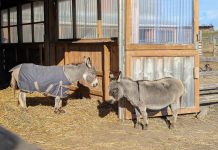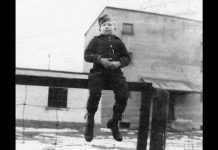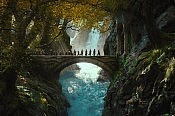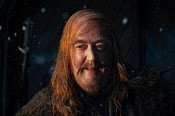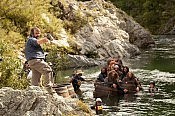Peter Jackson officially acquired George Lucas’ fantasy throne when he unleashed his The Lord of the Rings trilogy on the public at large during the holiday season of 2001. This bank-breaking endeavour dusted off Tolkien’s tomes and completely redefined the word epic in the context of film. The films became a brief December tradition as they were released mid-month between 2001 and 2003, and are still considered yuletide favourites for many. The Star Wars of the 21st century had arrived.
Unfortunately, like Lucas’ storied space opera, the record-breaking box office achieved by Jackson’s opus instantly green-lit production of a litany of hollow, money-grubbing prequels. Thus the comparatively flimsy predecessor The Hobbit was adapted into not one but three three-hour films: An Unexpected Journey (released in December 2012), The Desolation of Smaug (released this month), and There and Back Again (scheduled for release in December 2014).
How can 310 pages be spread into a coherent nine-hour narrative? Well, it can’t. On paper, The Hobbit is a linear “there and back again” adventure story for children, but on screen it is rendered almost unrecognizable and frankly should have been called “Tales from Middle-earth.” The lightweight plot is generously padded with excerpts from Tolkien’s for-completists-only slog, The Silmarillion.
Those who found the original The Lord of the Rings films exhaustingly episodic shall find no solace at this inn.
What story there is concerns a race of rustic primordial little people known as hobbits that reside in the agricultural haven of The Shire. Bilbo (Martin Freeman), a young hobbit living blithely in bucolic splendour, is recruited by the grey wizard Gandalf (Ian McKellan) to aid a group of dwarves in their effort to reclaim the Lonely Mountain from the affluent grasp of the dragon, Smaug (Benedict Cumberbatch).
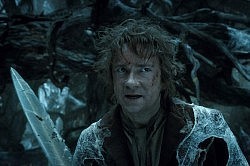
Rivalling the Pirates of the Caribbean franchise, the exceptionally convoluted plot rappels from one inconsequential strand to the next without even a glimmer of hope for a satisfying resolution. After all, it took this long to even catch a glimpse of the notorious dragon.
In a flagrant move that has upset many fans, Jackson and long-time collaborator Phillipa Boyens wrote in a female lead, Tauriel (Lost‘s Evangeline Lily), in the hopes of giving the story a more feminist stance that would stay true to the spirit of the text.
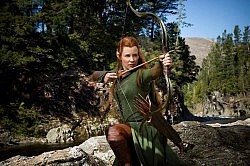
There is nothing remotely feminist about the masculine world of Tolkien and this was likely done so that girls would have an elf barbie to buy.
Once one shaves through the slapstick tedium, the magic occasionally works once more.
Gandalf exploring the chilling tomb of the Nazgul is a marvel of minimalist design in a maximalist enterprise.
The ridiculously well-executed river battle escape from Mirkwood Forest is a breathless set piece that renders everything after it anticlimactic.
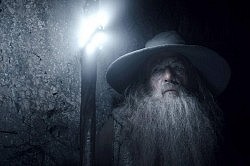
And no expense was spared on that dragon. It is a triumph of technology and imagination.
But the film lacks the supreme sense of immersion that made the original three so effective. The disappointingly heavy use of computer-generated imagery — combined with the advanced frame rate — creates a cartoonish and garish palette.
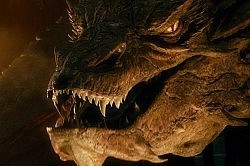
After encountering endless orcs and bi-racial bear men, the fledgling party must do battle with gigantic flesh-eating spiders in a sequence that is welcomingly reminiscent of Jackson’s all-but-forgotten yet excellent King Kong remake.
Finally arriving at Lake Town (likely the only set actually constructed out of physical materials), the breakneck narrative comes to a screeching halt and becomes mired in the deeply uninteresting politics of the floating city’s corrupt leader (Stephen Fry, wasted).
It is at this point that young and old alike will begin to shift in their seats and ask themselves ‘What is this film actually about?’
The viewing experience provides an overall sensation akin to slapping your childhood in the face. Though, nihilistically, I shall likely see the third film when it thuds into cinemas next Christmas.
For then, as the story meets in the middle, we can all breathe a collective sigh of relief that this baffling ordeal has come to a close.
Official Trailer
All photos courtesy of Warner Bros. Pictures





